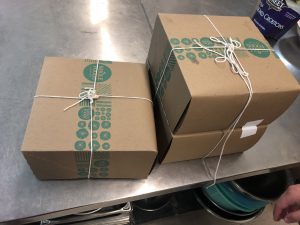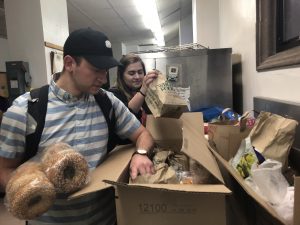When asked what topic I wanted to focus on for the group action project, I was immediately drawn to the food waste category. I know that a lot of food from restaurants and stores goes to waste, and I wanted to help change that. This paper and project ended up having a substantial effect on me, and I feel like this is one of the few final projects that I’ve really enjoyed participating in and writing about.
My group decided that we would contact a variety of restaurants/stores and shelters/food banks in order to take excess food waste from the former to the latter. We contacted Roots, a youth shelter near UW, and POPY’s, a shelter in Shoreline. Both were excited and willing to take any donations we could get. We were able to get donations from Einstein Bagels in University Village and Whole Foods. Whole Foods was able to donate pastries and bread, and we got about $200 worth of food from them. We took our donations to Roots because it was closer to the university, but I’d like to donate to POPY’s at some point on my own. Though we weren’t able to achieve our goal of donating multiple times (we only did it three times), it still made a small impact on our community and made a large impact on me.
When writing my final paper, I considered the material that we learned over the course of the last ten weeks, and most connected with the Pollan reading. When writing about Michael Pollan, I focused largely on how his ideal world was unattainable for anyone who struggled financially. Pollan completely disregards the fact that a large portion of our population cannot afford to simply “eat healthier and organic”. He ignores that food deserts are prevalent in our country, that not everyone has access to farmer’s markets and large organic supermarkets, nor the money for that. Restaurants and grocery stores produce excess food every single day and throw it away – a wasteful practice that could change and be useful for those who can’t afford food. Any establishment that refuses to donate excess food or produces a large amount of excess food at the end of the day and throws it out is contributing to a counterproductive cycle in society. Said establishments seem to have policies that line up with Pollan – if you have money you can eat, and often times you eat much better than those less fortunate than yourself. 


Response 3
Hi Rachel,
My group and I also did our project on food waste which had a very big impact on all of us. Similar to your group, we originally had the idea of having a booth at the University District Farmers Market with educational components as well as asking for donations from farmers at the end of the day. We planned on donating this food to local food banks or shelters. Although, this plan failed and ended up doing an educational video where we interviewed multiple people about food waste.
I like how you related your project to Pollan, nutritionism helped give rise to a ton of excess food since the 1970s as well as the industrialization of our food system. Reading through your post I could not help but comment on the part where you talk about how restaurants and grocery stores produce excess food and typically throw it away. Have you ever heard of Imperfect Produce? They’re an organization that takes fruit and vegetables that look “different” from farms. These fruits and vegetables would otherwise be left in the field or trucked to the landfill. Consumers can then buy and customize a box that gets sent to your home. Nothing is wrong with this type of produce; the farmers just cannot sell them to grocery stores because consumers will not buy them. Imperfect produce’s goal is to waste less food overall and I highly recommend checking them out!
Hi Rachel,
I was amazed the action part of your group such as get donation from Einstein Bagels in University Village and Whole Foods to the Shelter Roots, POPY’s. My group also worked on the food waste topic, but we want to investigate that are we underestimating food waste. Therefore, we made a website to draw more attention to the public, with the action part is encourage reader using a #hastaging big food cooperate on campus such as UW dining, Starbuck on campus. From what my group has been investigated, Starbuck has been wasted $500 million worth of food each year. I understand that many restaurants, food industries, and big food cooperation have the most unsustainable business practice. However, I’m glad that your group takes excess food waste from these stores/restaurant to resolve food insecurity is related to food waste, which my group hasn’t had a chance to touch on.
Thanks for your thoughtful article
It’s so good to hear that your group was able to make an impact on the food waste in our society by donating food not once but multiple times! While my action topic was global hunger food waste was my second choice because it’s something that I personally interact with on a more daily basis. I work at Starbucks inside of a grocery store and at the end of the day a large portion of our unsold pastries get thrown out despite the fact that they are still edible and could go to someone in need. Being that my Starbucks is inside of a grocery store I see various other forms of food waste all day long and it honestly really sucks. Some of the food within the store is donated and gets picked up daily but for whatever reason the Starbucks food is not apart of that. I would be really interested to learn exactly how much food is wasted in the food industry. There are so many ways to combat these high levels of waste so you should definitely be proud that you were able to help that!
Rachel, your project turned out amazing! I am happy that you were able to find a meaningful experience out of this! My group had a hard time with the outside organizations that we were attempting to work with, and our project took a turn that we did not quite expect. While I still had an amazing time doing the action project, I wish it had made an impact on me like it did on you!
Food waste is such a compelling topic, and I’m glad that your group was able to partner with local organizations to donate that food. One thing that is so crazy to me is that a lot of food organizations do not have policies lined up like this already. I mean, think about it. Tons of organizations and companies pride themselves on their community contributions, and I feel like something like this is easy to do! I am curious to see what type of legal barriers, if any, really prevent grocery store chains or specialty shops from partnering with local groups and donating. It is frustrating, like you said, that establishments just contribute to this counterproductive cycle without much seeming effort to change it.
I also really appreciate your comments about Pollan. I definitely thought those same things while I was reading it! I remember turning one page thinking to myself “I can do that, I can totally pay attention to what I’m eating, and not give in to the ‘man’,” but then I turned the next page and thought “Mmm, I can’t afford to be making these choices regarding food, so what does that mean about the population who aren’t over-privileged ‘broke’ college kids, but people who are actually in poverty?” It seems interesting that Pollan framed in such a way that it was a personal choice around food, when more often than not, the options presented are dictated by a different system not in your control.
Despite Pollan’s remarks, it’s super cool that you were able to connect Pollan—at the beginning of the quarter—and your group action project. Great job!
Hi Rachel,
I think your group action project was really great and that it had many elements factored into it. First was recognition — not many people know how much food gets wasted or understand how frustrating that might be for those trying to distribute food to those without it. While in Europe, I saw a lot of advertisements about the French model of dealing with food waste, which was quite similar to what you were doing. I wonder if you are considering on continuing this or at least trying to find ways to either educate or create programs so that food waste can be minimized in Seattle. While working with Whole Foods and the food pantry, did you ever discuss any of their past experiences with food waste organizations or any effort on their part to reduce their food waste? Also, I really appreciated your comments on Pollan’s book and your critique on his solution to eating correctly. I think it’s a great connection to how eating healthy is more complicated that just eating less, eating local, and eating more green. As you so rightly recognize, his goals are impossible the poor to achieve (at least without help). Overall, great job! So glad you and your group could connect with people, stores, and shelters to do this.